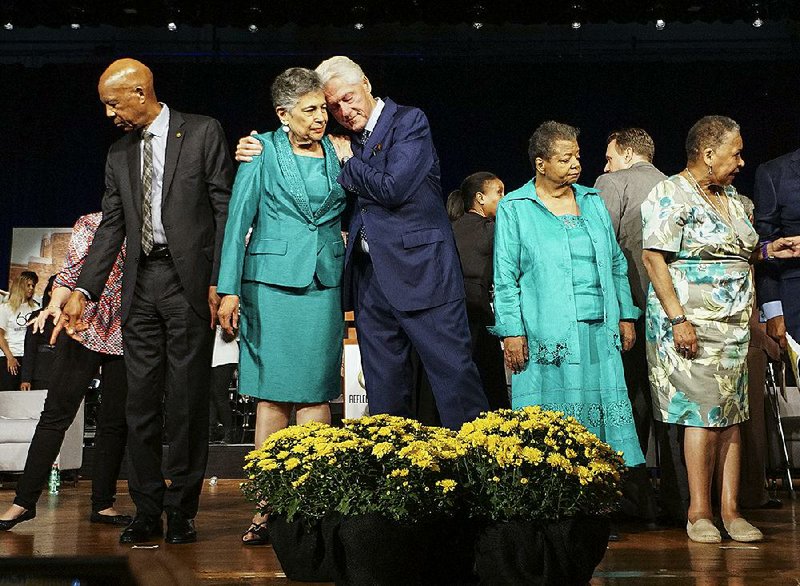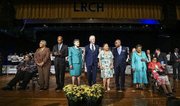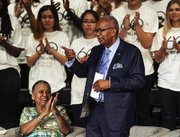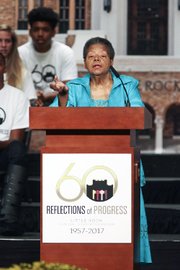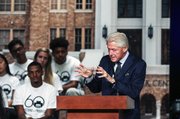Former President Bill Clinton and eight of the nine black students who 60 years ago desegregated Central High School -- in what became a defining moment for Little Rock and the nation -- tempered celebration Monday in the midst of national racial discord.
On Sept. 25, 1957, the Little Rock Nine, as they become known -- Melba Pattillo Beals, Elizabeth Eckford, Ernest Green, Gloria Ray Karlmark, Carlotta Walls LaNier, Terrence Roberts, Minnijean Brown Trickey, Thelma Mothershed Wair and Jefferson Thomas -- attended their first full day of classes after they were initially turned away by the Arkansas National Guard from entering.
On Monday, their remarks and those of Henry Louis Gates Jr., a Harvard University professor, before nearly 2,000 people commemorating the 60th anniversary were, at times, highly political and a call for action. Some remarks reflected Democratic Party positions in an audience that included some of Arkansas' highest-ranking Republican leaders.
"I wanted to stand up and say a lot of simple bromides ... and make everybody feel good and tell them I love them and sit down," Clinton said. "I wanted to say: 'You did 60 years. Take a victory lap. Put on your dancing shoes. Have a good time.' But instead, I have to say, 'You've gotta put on your marching boots.'"
Click here for larger versions
Photos by Brandon Riddle
Photos by Brandon Riddle
Members of the Little Rock Nine spoke of fighting "a war against the forces" that enable inequality and of enlisting a new generation of community activists and attorneys in the mold of those who helped them break Central High's color barrier.
Green in his address drew a parallel between historical events and both an NFL quarterback kneeling during renditions of the national anthem in protest of police brutality, setting off a wave of similar protests, and white nationalist marches last month in Virginia. He also mentioned the 2015 killing of nine black churchgoers in Charleston, S.C., by white supremacist Dylann Roof.
"The Little Rock Nine turns to the Charleston Nine, paying the ultimate sacrifice," Green said.
The commemoration, which lasted just longer than two hours, attracted a variety of dignitaries, including Gov. Asa Hutchinson; Education Commissioner Johnny Key; Little Rock City Manager Bruce Moore, who was a lead planner of the event; U.S. Rep. French Hill, R-Ark.; Arkansas Attorney General Leslie Rutledge; Secretary of State Mark Martin; and a delegation from Little Rock's sister city, Newcastle upon Tyne, England.
Unlike the recent anniversary ceremonies that were held outside, Monday's event was in the school's Roosevelt Thompson Auditorium. Central High's concert band and vocalist I.J. Routen performed in front of the school as audience members climbed the recently repaired front stairway into the landmark five-story school for the listed 10 a.m. start.
The Central High Crisis, the name it has taken in history, became an international sensation Sept. 4, 1957. Ten black students were to attend their first classes at Central High, but Gov. Orval Faubus dispatched the National Guard to block their entry in the name of keeping peace in Little Rock.
Images of Eckford, who clutched schoolbooks to her chest, being turned away and taunted by a segregationist mob went out worldwide, three years after the U.S. Supreme Court struck down separate but equal schools.
Three weeks later, the nine black students -- one opted against enrollment after what happened that first day -- entered Central High with the aid of the 101st Airborne Division, deployed by President Dwight Eisenhower.
In his commemorative address, Clinton talked about the genetic makeup of humans, that "we're all 99½ percent the same genomically." Yet some only think about the half-percent that is different from all the rest, he said.
"We are now living in a world where we're going back and revisiting the original question of this country and the original thing that tore this country apart in the civil-rights movement, which is basically whether all that matters is what's in that half-percent," he said. "Now we're back to square one ... back to tribalism. And it's sweeping the world."
People feel as though they've been passed over economically, socially, culturally and politically, he said, and on top of that they're "fed a steady diet of resentment," and they don't talk with anyone else or meet anyone else who may have a different stance.
"That's the core of it," he said. "Democracy requires diversity and debate."
Every religion -- Christianity, Judaism, Islam -- says that after love of God, "the most important thing is to love your neighbor," Clinton said.
"The Dhammapada of the Buddhists says that you're not really alive unless you can feel the air piercing another person's body as if it were entering your own," he added. "What is the matter with us?"
All the Little Rock Nine wanted to do was to live their lives and to be a part of America, he said. He recalled the 40th anniversary when, as president, "the most important thing" he had to do was to hold the door open. He realized then, he said, that the parents of the nine let them go to Central because of the promise it offered.
That same promise could help the nation confront its "real problems" together, he said. That would honor the Little Rock Nine.
"There is no point in our getting in our own way any longer," Clinton said. "We have to reject the sentiment and anger in favor of answers. We have to reject polarization and demonization in favor of racial respect."
"Are we really going to let more than 200 years of our struggle to get over the idea that our differences are more important than our common humanity just get blown away?" he asked later. "So, I ask you to say to them [the Little Rock Nine], 'We love you. ... Celebrate the day. ... Put on your dancing shoes. But tomorrow ... we need to get in the way. Tomorrow, we need you again. Put on your marching boots.'"
VOICES OF THE NINE
Members of the Little Rock Nine lamented the lack of progress since the Central High Crisis, criticized President Donald Trump and called on listeners to take action.
"Making history is not something we aspired to do," Green said. "We wanted the best education our parents' taxes afforded. We wanted what the Constitution says is the right to life, liberty and the pursuit of happiness, and I saw education as part of that right."
Roberts urged "professed Christians" to read their Bible, to "treat me as your child" and to help usher society "into the brighter light of understanding where we truly see each other as God sees us all."
"We all have to engage in the war against the forces that are determined to shore up and maintain the status quo," Roberts said. "How can we do that? You can decide to choose to live a life that's different from the life you've thus far chosen to live."
Green said that progress "is not a single action or moment" but "the small, mundane, everyday action."
"Progress is like water torture on the unrelenting enemy of stagnancy and complacency," Green said. "Initially it feels like nothing more than tiny droplets of water. After a while it beats away at hate, vile rhetoric, not as rushing water but still as seemingly small drops. Progress has to continue because there is no finish line."
No one during the commemoration spoke Trump's name, but two members of the Little Rock Nine made distinct references to him.
LaNier referred to Trump as "No. 45," or his spot in the line of U.S. presidents dating from George Washington.
"Behind the scenes and through his Twitter account, we become as we were 60 years ago," LaNier said. "We know these things, though: As a human race, we are strong people. In the words of the old Negro spiritual, 'We have come too far to turn back now.'"
When Moore, the city manager, reached out to her 18 months ago to ask how the anniversary should be commemorated, she responded that she wanted to have dinner "in the White House with President Hillary Clinton," LaNier said.
Trickey referred to Trump as "[No.] 40-whatever" and said he exemplifies "profound intentional ignorance."
An empty chair onstage among members of the Little Rock Nine represented Jefferson Thomas, who died in 2010. A black and gold ribbon -- the school's colors -- was draped over the chair.
The Little Rock Nine did not gather as a group until 30 years after that school year spent at Central High. They've gathered every 10 years since then.
Of the surviving eight members who gathered on the stage, only Eckford and Wair live in Arkansas. Others have been gone for decades.
"It is just such a joy for someone who has been away to come back and see the miracle of love and change," said Beals, who lives in San Francisco.
Karlmark told the crowd that everyone asks her about her first day at Central but no one asks about her last.
Karlmark said Central High yearbooks were handed out then.
"I had my book, and I knew people signed each others' books. But here I was, now a 15-year-old little girl, and who was going to sign my book? Who would I dare go up to and ask to sign my book?"
Karlmark said a girl named Becky, with whom she had secretly exchanged notes during the school year, signed her book. Then another girl approached her and signed the book.
"In a different age, we could have been friends," the second girl wrote, Karlmark said.
Karlmark moved to Kansas City, Mo., during the 1958-59 school year, when Faubus shut down all Little Rock public schools to postpone integration. She completed her high school education in Kansas City.
Eckford said: "I hope some day that opposing sides can have nondiscriminatory dialogue. The only way we can have true reconciliation is if we honestly acknowledge our painful but shared past."
GATES AND HUTCHINSON
"I feel like I'm visiting a religious shrine," Gates, the Harvard University professor, historian, and producer/host of the PBS television show Finding Your Roots, told the audience about Central. "And if this is a shrine, ladies and gentlemen, then these are the saints," he said, acknowledging the eight members of the Little Rock Nine on the stage to his right.
Gates recalled being 7 in West Virginia and watching the newscasts covering the crisis.
"Sixty years after the democratic revolution that happened in your town and in school ... we once again find ourselves in a struggle for freedom and justice in our land," Gates said.
The right for all Americans to vote for the candidates of their choice must be defended, Gates said, along with the rights to health care and to affirmative action programs that "launched people of color and women of all colors into their position of authority and power."
Gates called for a linking of arms against anti-Semitism, anti-black racial discrimination, and white supremacy, as well as against homophobia and Islamophobia.
Many risked and sometimes lost their lives "to make certain that the arc of the moral universe bent toward justice," he said.
"Too many hands today, ladies and gentlemen, are trying to bend that arc back in another direction, a direction toward the past," he said. "Those of us who love truth and justice, those of us who love principles of democracy upon which this great nation of ours was founded, must stand against those forces, just as the Little Rock Nine did here in this very place."
Hutchinson on Monday joined the ranks of his predecessors -- Govs. Clinton, Mike Huckabee and Mike Beebe -- in lauding the once-shunned students. He said the students "changed the path of a nation" in the early days of the civil-rights movement.
He thanked them for "enduring the pain" as they "confronted hostility, the unknown and a defiant governor."
"Arkansas claims you as pioneers, heroes and examples to follow. Thank you," he said.
Like the others on the stage Monday, the Republican governor also made reference to the divisions in the country.
"We are all made in God's image, and America cannot fulfill its destiny if we limit any person's dreams because of how one is born," Hutchinson said. "We are all part of the fabric of this nation, and we hope our greatness will be defined by our goodness."
He warned that the victories achieved by the sacrifices of the nine students do not carry any guarantees for future generations.
"We must be constant in educating the present generation about tolerance, forgiveness and equal treatment," Hutchinson said
Some of the other speakers Monday included Little Rock Mayor Mark Stodola; Cameron Sholly, the Midwest regional director for the National Park Service; Joy Secuban, Central High student body president in 1993-94; and Darrin Williams Sr., Central High student body president in 1985-86. Sybil Jordan Hampton was master of ceremonies. Little Rock School District Communications Director Pamela Smith sang the national anthem, and Central Principal Nancy Rousseau introduced Clinton.
REACTION
White House spokesman Sarah Huckabee Sanders, who had attended Central High, during Monday's media briefing called the Little Rock Nine "American heroes who courageously advanced racial equality."
"It's not lost on the president or his administration that there is more work to do," Sanders said. "We need better schools, and we need better jobs to provide a safer, stronger, more prosperous future for every American."
Jay Barth, chairman of the state Board of Education and a political scientist, said each Central High crisis commemoration has been shaped by the political context of the times, as was the case Monday.
He said the 60th anniversary event was marked by the "personally moving remarks from some of those voices [of the Little Rock Nine] who had not been heard from before. Some folks by choice have been more vocal," Barth said, noting that Green has been a spokesman for the former students.
"I thought [Karlmark's] comments were the most powerful and lovely," Barth said, "because they were so intimate and on a level where folks of all ages could relate -- trying to figure out who is going to sign an annual yearbook. We've all been there."
Tracy Steele, a former legislator and now a North Little Rock School Board member, said the speeches of the Little Rock Nine will be what he remembers.
RELATED ARTICLE
http://www.arkansas…">Opera voices aspirations of LR Nine
"They are still hopeful," he said. "They are pleased but not satisfied. Just when you want to pat them on the back, they are ready to take off running again. Everybody who has received a quality education owes a debt of gratitude to the Little Rock Nine."
A Section on 09/26/2017

